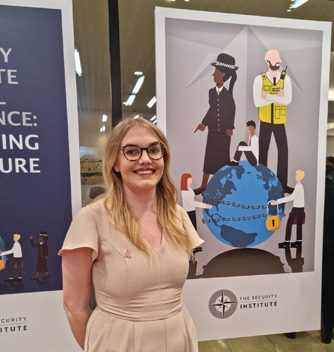The annual conference of the Security Institute remains a premier event in the UK security industry calendar, writes Mark Rowe; quite apart from what’s said, for what the event tells us about the progress of the industry in the private and public sector alike.
The venue, courtesy of Aviva corporate security man John Bernard, was the insurance company’s office block in Undershaft, in the City of London (think across the road from the ‘Cheese-Grater’). To the visitor from out of town, the venue was eye-openingly impressive: a video wall in the conference room that may have stretched from one Underground zone to another; the choice of still or sparkling water, in cans. Another industry body, the UK chapter of ASIS, likewise is able to draw on members and the goodwill of their employers to meet in such prestigious locations.
In the November print edition of Professional Security Magazine are pages on the Chartered Security Professional annual dinner, that heard of UK Government Security Profession (govsec for shorthand) backing for CSyP. The final panel talk of the conference, led by Home Office head of security Charlie Curry, likewise spoke volumes (never mind the content) about how govsec is engaging with the wider security industry. It always has in terms of individuals’ own careers, working in the police or armed forces, then going into security management or consultancy.
What was striking were admissions or reminiscences that the police and govsec do not always have the best or most timely intelligence, for example for response to acts of terrorism, or to inform preparedness in case of attacks. As a sign of how connected people have become, the news of the resignation of Liz Truss as prime minister was murmured among the audience as it came through on smartphones, and left the always engaging speaker Mike Croll (who himself has made a journey from public service to corporate security) amused as the last to know in the room.
To mention Mike’s talk in some more detail, he ranged over the story of surveillance, that is rooted in human history and religion; and politics in its widest sense, whether you incline to George Orwell’s 1984-Big Brother dystopia, or the utopia of the utilitarian philosopher Jeremy Bentham (who’s seated stuffed not many miles away at University College London, as featured in the February print edition of Professional Security Magazine).
The internet and such devices as baby-monitoring socks; and smart watches (as worn by some in the audience) mean continuous monitoring, Mike noted, of our online activities; and even our physiology – such as our heart beat. That data is stored forever. Mike recalled the Phil Dick science fiction short story turned into Tom Cruise film Minority Report – which no longer feels like science fiction, Mike said: “And it’s people [security professionals] like us who are driving this.”
With such surveillance data we’re on the brink of a new era in security, he suggested; but does society or those doing security want it, and ought they to? A panel discussion followed where the sense was that there’s no avoiding such a world, and even if a country made laws against it, the rest of the world would make that resistance redundant.
While not the most important facet of the day, Mike’s talk and a later one by Institute counter-terror special interest group (SIG) co-founders Steve McGrath and Andrew Donaldson on Islamist terrorism firmly planted present-day security in tech and other developments of previous decades. Did you know for instance that CCTV – literal closed-circuit television – was part of Nazi Germany’s V2 scheme, the CCTV covering the launch ramp of each rocket?
That the how and why of security has a traceable back-story is a sign of a more mature security industry that can stand professionally with police and government; and to other functions, such as IT and HR. Implied in being professional is a process of staying professional, up to date in your knowledge, which requires CPD (continuing professional development), such as by attending events. Rather than relying on your past, and, as a speaker put it, saying ‘don’t you know who I was!?’.
One thing that private security has been poor at, is marketing itself, which made the large posters at the event so refreshing – pictured, with the designer, Institute staffer Jade Lapper.
As for that session by McGrath and Donaldson, joined by Carl Dakin, it set out reasons why Islamist terrorism is an ‘enduring threat’ – the very term used earlier this month at the annual conference of the Association of Security Consultants, Consec.
As for getting on for two years now, the proposed Protect Duty – a legal requirement that all venues and ‘publicly accessible locations’ take responsibility for protecting against terrorism – was well covered.
More in the December print edition of Professional Security Magazine.










